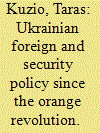| Srl | Item |
| 1 |
ID:
177997


|
|
|
|
|
| Summary/Abstract |
We investigate external and domestic political influences on defence burden of the 28 EU member states, based on time-series cross-section data from 1993 to 2017. Our research is one of the most comprehensive studies on EU members' defence, as it includes many potential explanations. Our findings do not support freeriding by EU members, both NATO allies and non-NATO members, on US commitment in the defence and security field. Relatedly, NATO membership does not come up in the analysis as an instantaneous guarantee for an effective special relationship with the US. However, there is evidence of freeriding by EU members not belonging to the Alliance on EU-NATO member states. Domestic political factors are also important: right-wing parties in government are associated with heavier defence burden, while upcoming elections tend to reduce it. In general, we find that to provide an accurate explanation of military spending, one needs to take into account a multitude of different factors and, moreover, pay attention to conditional effects.
|
|
|
|
|
|
|
|
|
|
|
|
|
|
|
|
| 2 |
ID:
075246


|
|
|
|
|
| Publication |
2006.
|
| Summary/Abstract |
Kuzio instead focuses on the foreign policy in post-revolution Ukraine. The centre of Kuzio's analysis is Ukraine's EU and NATO trajectories. He first analyses Yushchenko's EU and NATO orientations and commitments, which marked a decisive shift from the ambiguous stance of the previous regime. He then surveys the respective positions within the political party system and the public at large on these two foreign policy questions. He concludes that NATO's "open-door policy" as opposed to the EU's policy of passivity and reticence has produced a difference in Ukraine's move towards the former as opposed to the latter. However, the Ukrainian political system and public remain far more reluctant and uncertain about the desirability of NATO with respect to EU membership, casting the country's foreign policy in a potential state of flux.
|
|
|
|
|
|
|
|
|
|
|
|
|
|
|
|